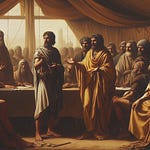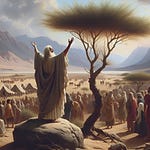Chapter Notes
If ever there was a book of the Bible that shaped every other book in the Bible, this might be it.
In Exodus 1 we commence a journey that will bring us through three monumental events, the redemption from Egypt, the giving of the law, and the establishment of Israel as a nation.
Commentary
It may be helpful to plainly state in a day of liberal scholarship that Moses is the writer of Exodus (Joshua 8:31; Mark 7:10). The book begins by picking up on the plan God revealed to Abraham in Genesis 15, specifically, that his posterity would spend 400 years in a strange land. Years pass, and Moses picks up the record of what occurred just prior to his own generation.
vv. 1–7 - we’re given a list of the tribes. This does not include Ephraim and Manasseh because they were already in Egypt. The sons are also listed, not by chronological birth, but according to their mothers: Leah, Rachel, Bilhah, and Zilpah. v. 7 shows us how the covenant community multiples. Terms are layered one on top of the other to communicate what has happened. This growth fulfilled God’s command to man in Genesis 1 and 9, and God’s repeated promises to Abraham.
vv. 8–14 - Since Joseph met his great grandchildren, another 70 years after his death, there would be those who still possessed a personal memory of Joseph. However, a new pharaoh arises with no knowledge or regard for Joseph. Some believe there was, at this time, a new Egyptian dynasty. Regardless, either there is a loss of the memory of Joseph’s significance, or it may be combined with a purposeful disregard for what he accomplished. The new Pharaoh initiates a campaign of propaganda, suggesting that their peaceful neighbors represented a threat to Egyptian existence. Like many lies, its power is in the fact that contained in it is a seed of truth or probability. This lie provides a platform to launch an assault on the Hebrews. As such, taskmasters are appointed. We are not told precisely how the Hebrews became enslaved. Was it by force, or developing new laws with slavery as punishment, or through an agreement for the right to have their livestock on the land? Whatever the case, they end up being utilized to build treasure cities which kings of Egypt used as storehouses of some description. But after years of oppression, the Hebrews still multiplied. This leads to an increase of hard labor.
vv. 15–22 - when Pharaoh’s best effort to oppress the children of Israel fails, he adds a third strategy; have the midwives kill every newborn male. Only two midwives are mentioned, because he wanted to begin with a subset of the midwives, or because these women had oversight of all the midwives. If this succeeds, the Hebrews perish or the women are incorporated into Egyptian culture. But the request is met with civil disobedience. When Pharaoh eventually realizes his request is being ignored, the midwives say the Hebrew women deliver too quickly. At the very least, this was a partial falsehood. Despite this, God favors the midwives and the Hebrews continue to multiply. The language “he made them houses” is debated. There are various views, the primary two being God prospering the households of the infants the midwives save, or, as is more likely, the families of the midwives. Pharaoh then moves to his fourth strategy; everyone is obligated to drown infant Hebrew males in the river. Had he never said this, Moses would never have ended up in the royal household and prepared to be a deliverer.
Application
Knowledge of a person is an agent in kindness to them. Pharaoh’s wickedness arises out of a personal knowledge of Joseph. This underlines the weakness of men to love that which is not known. I remember having unhealthy thoughts about someone I had never met. One day I thought that if I met them, it might help keep me from sin. So I sought the person out, spent time with them over lunch, and began to think better of them. Only God knows how much healing occurs in the body of Christ over a good meal and meaningful conversation. Make use of hospitality to restore strained relationships.
Affliction is a divine tool to maintain purity. We learn from Ezekiel 20 that some of the Hebrews were given to the idolatry of the Egyptians. When they become classed as slaves, it functioned to keep them from assimilating into Egyptian culture since the Egyptians would be unlikely to marry them. Thus, it was not just favor from Pharaoh, which saved God’s people in Joseph’s day, but the affliction that followed. God still does this, using persecution to maintain purity in His Church and affliction as an instrument for sanctification. Psalm 119:71, “It is good for me that I have been afflicted; that I might learn thy statutes.” If you are suffering today, thank God for it. It ought to turn you from sin and keep you away from sin.
So-called serviceable lies are sin. Many suggest that God approved the deceit of the midwives. From here and other Scriptures, they argue that we do not owe the truth to those we know will abuse it. To be honest, I sympathize with that view and I have argued for it in the past. What do we say to the Nazis, asking us if we know the whereabouts of Jews? Do we tell them we don’t know when we do, knowing that they will use the information to kill them? But it’s hard to argue with Calvin when he says, “whatever is opposed to the nature of God is sinful.” Scripture is clear: God cannot lie (Titus 1:2; Heb. 6:18). Since God cannot lie, we should not either. Faith speaks the truth, come what may. The Larger Catechism says, “speaking the truth, and only the truth, in matters of judgment and justice and in all other things whatsoever.” The Hebrew midwives were blessed because they feared God, not because they lied. Let the Muslim justify lying, but let it not be the position of the people of God.
God’s kingdom advances when ordinary people obey the Lord. It was not through a mighty prophet that God would serve the Church, but through two midwives. A midwife may not imagine her work integral to God’s kingdom, but it is. This is an important truth for children and young people to grasp as early as possible. There is no place where the consecrated life cannot be used by God.
Persecution is cruel, but often counterproductive. The rise of a Pharaoh who turns against the children of Israel is not to be understood as an unfortunate event or mere racial opposition. These attacks—which occur repeatedly in Israel’s history—are driven by Satan’s desire to prevent the coming of the Messiah. That is why any success Pharaoh enjoys must be short term. It’s easy to read over vv. 11–12 and not consider the dramatic social change this brought into the lives of the covenant people. Yet, despite Pharaoh’s best effort, the Hebrews flourished. So it is with the Church in every age, whether it be Diocletian’s persecutions or the murderous dragoons of Claverhouse in Scotland, Christ’s body cannot be extinguished. She will survive and can often thrive in the worst social and political circumstances. Next time you think a new law or government is going to hinder the church, read Exodus 1:12 and rest in the One who has all power in heaven and on earth.
“Whatever has been done by the enemies in rage or in recklessness, God has always met it calmly and quietly. He has shown Himself ready for every emergency. And He has not only baffled and utterly defeated all the inventions of wicked men, but He has turned their strange devices to good account, for the development of His own sovereign purposes. He has made His enemies work for Him, aiding the enterprise they eschewed: He has turned their curse into a blessing: He has made evil productive of good: He has extracted sweetness out of their bitter: the clouds are the dust of His feet.” — Charles Spurgeon











